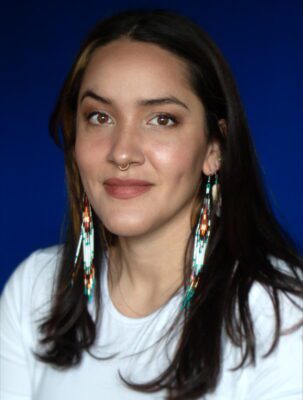Name: Candace Stock ChaxChep Heweska Winga
Location: Fargo, ND
Education/background: Bachelor’s degree from The Culinary Institute of America
Tribal affiliation: Ho-Chunk, Cherokee, Pawnee, Kaw descendant

What led to your passion for Indigenous foods?
My journey towards culinary success and passion for Indigenous foods has always been my calling. All my core memories have been linked to food. I grew up on a farm in Mahnomen, MN, where I tended to the garden with my family and enjoyed exploring the woods around our home. It was a beautiful and grounding experience. There were plenty of berries and flowers that we would seek like treasure and those moments live with me today. I decided when I was 12 that one day I would be a Chef. I was driven by a desire to care for my family with simple healthy meals. My grandmothers gifted me with this love; the love of nourishment, shared time and hard work preparing a taste and moment.
I have always been proud of my heritage and found that our cuisine is simple and clean. Understanding it best actually came from traveling. I took a term in China and focused on their food medicine practices and realized that I had that at home all along. It wasn’t documented or structured teaching, but my family had given me a great foundation to build off of. Since 2013, my efforts to develop stronger ties to my community, land, and family heritage have clearly defined my relationship with food and the desire to create meals that are authentic to my culture as well as nourishing to the body and spirit.
Why do you think it’s important to make traditional foods accessible for Native people?
The importance of making traditional foods accessible for Native people is deeply significant. Genetically, Native people have been affected by changes to their diet due to starvation and the replacement of traditional foods with U.S. government commodity foods that are high in saturated fats and sugars. The removal of natural foods from their traditional dietary routines, along with being relocated to reservations, has led to health challenges such as diabetes, obesity, and heart disease. The relationship with the land is crucial, and highly processed foods and invasive plants are not compatible with Native ways of living. The healing power of traditional food practices and the potential to reclaim what was lost through colonization is profound. It is clear that healing and restoration are vital to overcoming systemic obstacles.
What is the importance of an indigenous diet for a healthy lifestyle?
It begins with the land and water. My family has always stressed the importance of protecting water, as it is the greatest gift given by the Creator. The relationships formed through respect for the land and the act of harvesting instill a lifestyle that brings mutual benefits, not only to the individual but also to the land. What we take from the land must always be given back. A man once asked me why I forage when some things can be planted in my garden or bought from the store. It has always been my belief that if I am not willing to work for something, I do not deserve the benefits. I will not receive the full benefits if I choose a product wrapped in plastic or a plant that is transferred and fenced off with little interaction with nature. Plants in nature are far more adaptive and resilient, just like my family and our people. Choosing natural lifestyles and returning to healthy foods will improve the health of the People, and the benefits they receive from this approach, rather than opting for convenience, reflect a deeper understanding of resilience, sustainability, and adaptability.
What ways are you involved in the education, restoration and accessibility of traditional Native foods?
My involvement in the education, restoration, and accessibility of traditional Native foods is another passion I deeply enjoy. Working at the Theodore Roosevelt Presidential Library and integrating indigenous perspectives into the café and catering services is a fantastic initiative. The cooking demonstrations and plant identification classes enhance the experience of sharing my culture while also ensuring the preservation of natural resources in our area. Additionally, my collaboration with a local organic farmer and the program designed to engage Native youth in farming and foraging is a wonderful way to pass on my knowledge and skills. The connection between agriculture, food, and cultural teachings is very important, as it reminds me of the lessons I learned as a child from my family. The growing interest in indigenous cuisine and the responsibility to speak on heritage and history serves as an invitation to help people better understand both the past and present of Native communities.
How can community members be involved and support the cause of restoring and protecting indigenous food systems?
I am dedicated to collaborating with my community members who facilitate the cause of restoring and protecting indigenous food systems. The reciprocal relationship with our communities and the sustainability of our indigenous land stewardship practices are crucial. Foraging as an immersive experience and the importance of respectful harvesting practices are key steps in this process. For those who may not wish to forage or farm, sourcing from responsible farmers or companies is a great alternative. The opportunities for grants through organizations like the Native American Food Sovereignty Alliance, which fund classes and events, are essential. Participation in these events strengthens the mission to fight for access to Native foodways and supports the revival of old Native practices that are vital for our future.
